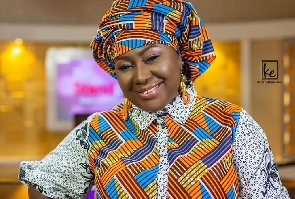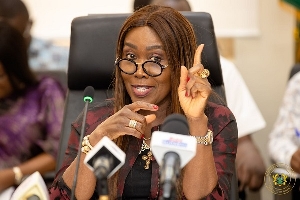Opinions of Thursday, 17 July 2008
Columnist: Dusuuru Bamba
Of Honors Not Being Constitutional Honors
: Order of the Star and Eagles of Ghana
Our President has decided upon “wide consultation” to institute the Grand Order of the Star and Eagles of Ghana to complement the national coat of arms. This freshly minted Order is to be the highest honor to be accorded the occupant of the High Office of President. According to Andrew Awuni, the government’s Press Secretary, this new order would also serve as a symbol of Presidential office. In providing more details our President in announcing the institution of the new Order declared “…every new president will be given the color of the order as he or she is sworn into office. And this order will be worn on all formal national occasions....This order will be conferred on the president by the Chief Justice.” By dint of executive magic, our President not only institutes a new order, he also directs others as to what they should do: all presidents should wear the order “on all formal occasions”, and the Chief Justice should confer the order on presidents when they are sworn into office. That must be a sovereign acting in his elements!
It is not the focus of this piece to examine the merits of the decision of the President to institute a new Order. I believe in national honors. I believe organizations, and individuals, including the President, should get national honors if they are deserving. There might be reasonable disagreements as to who should be entitled to the highest honor of the land, whether it should be limited to Presidents, and in what circumstances a new category of honor should be instituted. I tackle none of these here. Let me say in passing that I believe in a fair, open and clean process for selecting potential awardees of national honors. At risk of sounding pedestrian, I also agree that a country that does not honor its patriots is not worth-dying for.
Yet the decision of the President to institute a new Order has not been without controversy. Before the national honors ceremony that took place on Thursday 3rd July 2008, I had heard two diametrically opposed arguments respecting the creation of the new order. The first argument was to the effect that the President could create the Order without any reference to Parliament because the law on national honors (Honors Warrant, 1960) vested in the President the power to so create new categories of honors and orders. The opposing argument was to the effect that he needed parliamentary backing to create new honors and orders .I couldn’t decide between the two arguments though instinctively I felt a new Order of such great national importance with continuing public concern, and involving a matter of a permanent nature (instituting a symbol of office for the president, and honoring a President for assuming the office of President) should have legislative backing.
The reason is simple. If national honors and orders can be created by Presidents at will without any reference to Parliament this might introduce some instability and lack of continuity in categories of national honors and orders. Theoretically, some legislative oversight ensures more careful consideration of the matter, and of course, provides the opportunity for citizens to have their voices heard on the creation of national honors and orders, through the intervention of their representatives in Parliament.
I combed our laws to find the source of the putative power of the President to create new orders. I came across the following. The 1960 Constitution of Ghana had provided in article 8(2) that the President shall be the Commander-in-chief of the Armed Forces and the Fount of honor. I tried to find the meaning of fount of honor. I consulted the Webster’s 3rd New International Dictionary of the English language. Fount of honor has its history in the British Crown which “was conceived as the source of all justice, honor, dignities, titles, peerages, and privileges”. I found the following statement also revealing: “arms and honors have always proceeded from the sovereign as the fountain of honor”.
Under the 1992 Constitution, our President isn’t our Sovereign.
Rather, the people of Ghana are the repository of Ghana’s sovereignty. And our sovereign power to legislate on any matter is vested in Parliament composed of our representatives, who deal with all matters of a legislative nature, except those expressly reserved for the executive or some other body.
I also consulted the book The Constitutional Law of Ghana by F.A.R Bennion.In commenting on the meaning of Fount of Honor, Bennion says as follows:
The concept is of course borrowed from the British crown, and places in the hands of the President full control over the grant of honors and awards by the state. The functions so conferred were exercised immediately and by the Honors Warrant, 1960 the President set up two types of awards. The first type consisted of various Orders of the Republic of Ghana, namely the Order of the Star of Ghana, the Order of the Volta and the Ghana Service Order. The second type consisted of various Presidential awards. These were the Nkrumah Cross, the Ghana Military Cross, the Ghana Police Cross, the Kwame Nkrumah Prize, the Ghana Gallantry Medal, the Chief’s Medal ,the Armed Forces Long Service and Efficiency Medal for Officers, and the Ghana Long Service and Good Conduct Medal. The Warrant went on to provide that matters relating to various Orders and Awards were to be governed by such statutes and regulations as the President might make.( see pp 132-133)
Clearly, the President, under the 1960 Constitution, had exclusive control over the grant of honors and awards by the state. This was so because we expressly conferred such powers on the President. Unfortunately for our subsequent Presidents, we chose not to include the expression fount of honor in the 1969, 1979 and 1992 Constitution. Evidently, the President lacks the express power to institute and grant his newly minted Order of the Star and Eagle of Ghana.
On Thursday 3 July 2008, the President in announcing the new order chose his words with extreme care. He traced his source of authority to create the order to the powers vested in me as President and Head of State of Ghana. He mentioned no specific powers. Lacking the legal fortification the 1960 Constitution provided the then President in terms of express power to create and grant honors and orders, our President seeks to rely on “inherent executive powers”. Does the President have any such inherent executive powers to create new honors, orders and symbols of office?
Under our present constitutional dispensation, I am of the view that the people of Ghana retain the fount of honor, which is exercisable through legislation passed by Parliament.
Institutionalizing an order or honor is a law-making function. The President can perform this function if the Constitution or an act Parliament so confers on him the requisite power. In the 1960 Constitution this was beyond dispute because article 8(2) expressly said “The President shall be the Commander-in-Chief of the Armed Forces and the Fount of Honor”. Absent express powers granted the President to create orders he cannot imply powers to create national orders. The President’s conduct smacks of law-making. If the President is bent on creating and maintaining the Grand Order of the Star and Eagle of Ghana he can make recommendations to Parliament which might decide to pass a new law for that purpose.
The President definitely can lay claim to inherent powers in relation to his executive functions. That is the maintenance of law and order, and of course, the formulation of policies. These inherent powers can be traced to article 297 ( c) of our 1992 Constitution which provides that “where power is given to a person or authority to do or enforce the doing of an act or a thing,all such powers shall be deemed to also given as are necessary to enable that person or authority to do or enforce the doing of the act or thing”. But our President has no inherent executive powers to create a new category of honors without any reference to Parliament. He is not our fount of honor as conceived under the British Crown.
Our President’s role in the legislative process is limited to making recommendations to Parliament (policy formulation), assenting or vetoing bills. A matter as important as the institution of a symbol of office for the President should have been pursued on clear legal grounds, not on implication of inherent powers that might be difficulty to justify.
Is someone mounting a challenge in the Supreme Court? I have my doubts it will get any far. Strategic, sometimes it is, to leave “harmless” legal matters hanging when you are not too sure whether a legal strike will be productive. You can’t be sure you won’t get CJ Wood’s vote! She decorated the President with his new Grand Order of the Star and Eagles of Ghana! Meanwhile, I think I deserve to be an awardee under Ato Kwamena Dadzie’s honor category of the Grand Order of Vultures and Rats of Ghana. “Vultures”! Nice expression. It reminds me of the poem The Vultures; and here I go: “In those days when civilization kicked us in the face….”. You know it too! Let the lines run!
Dusuuru Bamba dusuuru_bamba@yahoo.com
Entertainment











